

The Incredible Edible Egg


There’s no question that the egg is one of nature’s most nutrient-dense perfect foods. It’s also very economical which makes it all that much better. In fact, the egg is so popular that a simple picture of an egg holds the world record for most likes on Instagram (at time of publication, 54M likes).
For a long time, eggs were vilified because of their cholesterol content. Well, in case you didn’t hear, in 2015, the US Dietary guidelines removed the cholesterol and 35% limit on total dietary fat.
Why?
There wasn’t enough scientific evidence and no significant relationship between dietary cholesterol and serum cholesterol.
Personally, I always liked eggs but never liked the yolk portion of the eggs. Something about the runny consistency was never something I enjoyed and when I (wrongly) was taught that yolks are high in cholesterol and in turn, would cause me to have high cholesterol and possible heart disease, I was happy to eat only the egg whites for most of my adult life.
Once I became a nutritional therapist, I realized how wrong I was about egg yolks. They are one of the most nutrient-dense foods. The yolk is the substance for the embryo to thrive—no wonder such a small food packs so much nutrition. The yolk is rich in fats, good cholesterol, proteins, iron and other minerals, as well as lecithin and other emulsifiers.
Some believe that egg whites are the main cause of egg allergens. The albumin from the egg whites, with its high protein content, can be the cause of severe allergic reactions such as watery eyes, hives, rashes, redness and swelling, stomach cramps, vomiting, and asthma. It is difficult to say if egg whites are the true allergen as it is nearly impossible to remove all parts of the egg whites, even when consuming just the yolk.
Consuming raw egg whites can also potentially cause biotin depletion in the body. In raw eggs, biotin is bound to avidin whereas when the egg is cooked, the biotin separates from the avidin, allowing the biotin to be absorbed by the body. Biotin deficiencies can lead to seizures, skin disorders, hair loss, severe joint pain and lack of muscle tone and coordination. This may be another reason why some nutrition-enthusiasts choose to only eat the yolk.
Regardless of what part of the egg you prefer to eat, if you can consume the whole egg, I recommend eating them (daily), as eggs are a nutrient-dense food. You can see more of the amazingness that is an egg in the following infographics.
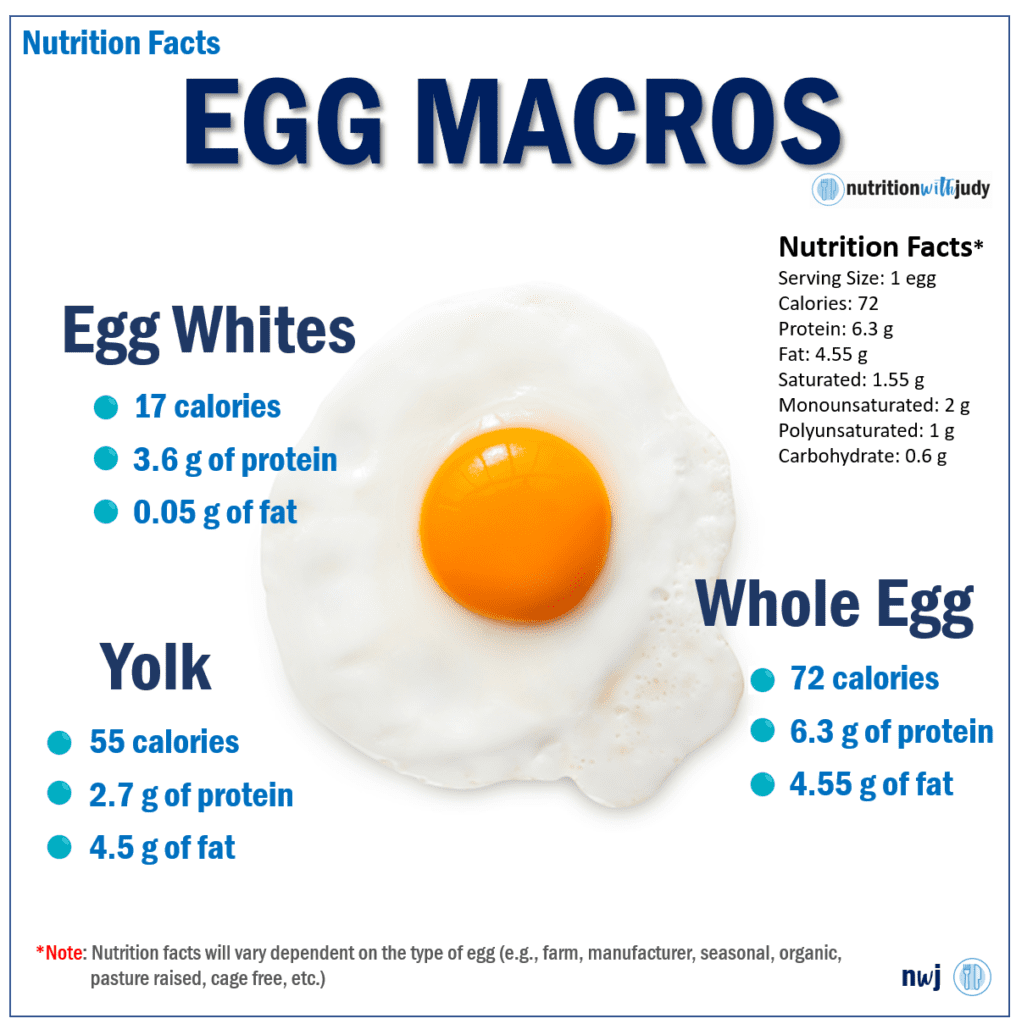


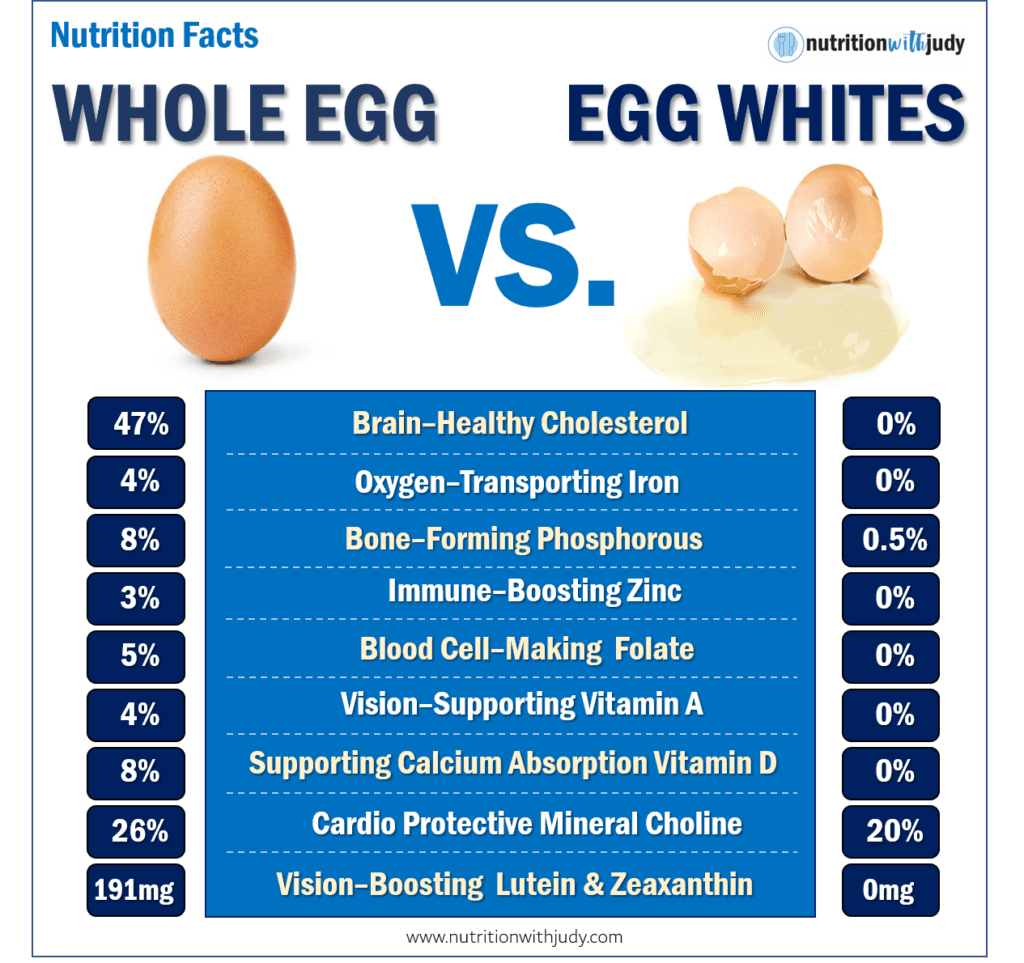




The best egg sources will be through local farmers that are certified organic and pasture raised (with no soy or corn feed). These eggs usually have richer (read: amber) yolks and likely better nutrient density.
Digressing about Soy
Chickens weren’t meant to eat soy. In fact, raw soy can impair the growth of chicken because soy contains enzyme inhibitors and can cause nutritional deficiencies, such as manganese, iron, vitamin E, Calcium and Zinc. Farmers have to cook and process soy in order for chickens to consume soy. A big indication that chickens should probably not be eating soy (and maybe even a bigger indication that humans shouldn’t be eating soy…)
Some chickens have to take iron supplements as soybean proteins tend to have chickens with iron and vitamin E deficiencies (compared to chickens raised on casein). Soy-based chicken feeds can cause zinc deficiency in chickens, causing abnormally formed bones and issues with their legs. These deficiencies can cause the chickens to have less nutrient-dense meat and eggs but they will likely die earlier.
To add fuel to the fire, almost all of the soy in the US is genetically modified. That means the soy contains Antibiotic Resistant Markers (ARMs) (“considered relatively safe for human consumption,” for now) and these crops can be sprayed with much heavier pesticides and toxic chemicals (and survive), because they are GMO crops. Their DNA- was designed to survive these toxins while killing all unwanted pests.
The final blow is that soy is very high in phytoestrogens. What is that? Phytoestrogens disrupt hormones. They mimic estrogen and some women that are going through menopause take phytoestrogens, which essentially behave as weak estrogenic mimics. They can disrupt the endocrine system (the hormone system) and cause adverse health effects in our body.
How Does This Relate to You?
Soy feeds may cause chickens to have a slew of nutrient deficiencies because of enzyme inhibitors. It’s apparent with the physical abnormalities of the chickens, as well as early death.
If you eat chickens that were fed soy, you may be eating chickens that have less nutrient-density than non-soy, non-corn-fed chickens. Additionally, you will be eating GMO crops (crops that your DNA was not altered to survive if consuming) that are phytoestrogenic. If none of that matters (which I think its progress and not perfection), I ask you to think about soy itself.
If soy is that enzyme-inhibiting and physically damaging to chickens, what do you think it does to humans? I want to drive this home because soy is in everything. (Hydrogenated) soybean oil, soy milk, tofu, vegetarian meats, miso, edamame, soy sauce, the list goes on. Soybean oil is in almost every mayonnaise and salad dressing on market shelves and these vegetable oils are almost always oxidized, causing a high amount of inflammation in the body. (Inflammation = disease, especially heart disease) Maybe it’s best not to consume the enzyme-inhibiting, nutrient-blocking, estrogenic, GMO soy.
Just something to think about.
Back to Eggs
I wouldn’t focus solely on the yolk color for nutrient density (see below).
Darker orange egg yolks usually mean the hens were pasture raised and able to forage. Usually, the color of the egg yolk is indicative of the hen’s diet. The darker the color yolk, the likely the consumption of carotenoids—natural pigments found in plants. That said, a chicken’s optimal diet is not vegetarian but omnivorous with the inclusion of insect and animal proteins. It is solely the presence of carotenoids alone that determines the color of the yolk. Carotenoids are good but we want the chicken to also consume insects and animal proteins—foraging in their natural environments.
What’s the Takeaway?
Try to buy local organic and pasture raised. If that’s not what you can afford, I still think conventional eggs are better than none. We can’t always afford or have access to crème de la crème and that is perfectly fine. Have some leniency. I personally believe it’s better to be imperfectly perfect for the long run than try to maintain perfection and burn out.
Just do your best with what you can and what you have. Our bodies are much more resilient than we think. We didn’t get sick because we ate conventional eggs. We all know that. Eat real wholesome foods. Give thanks and believe in healing. The body will take care of the rest.
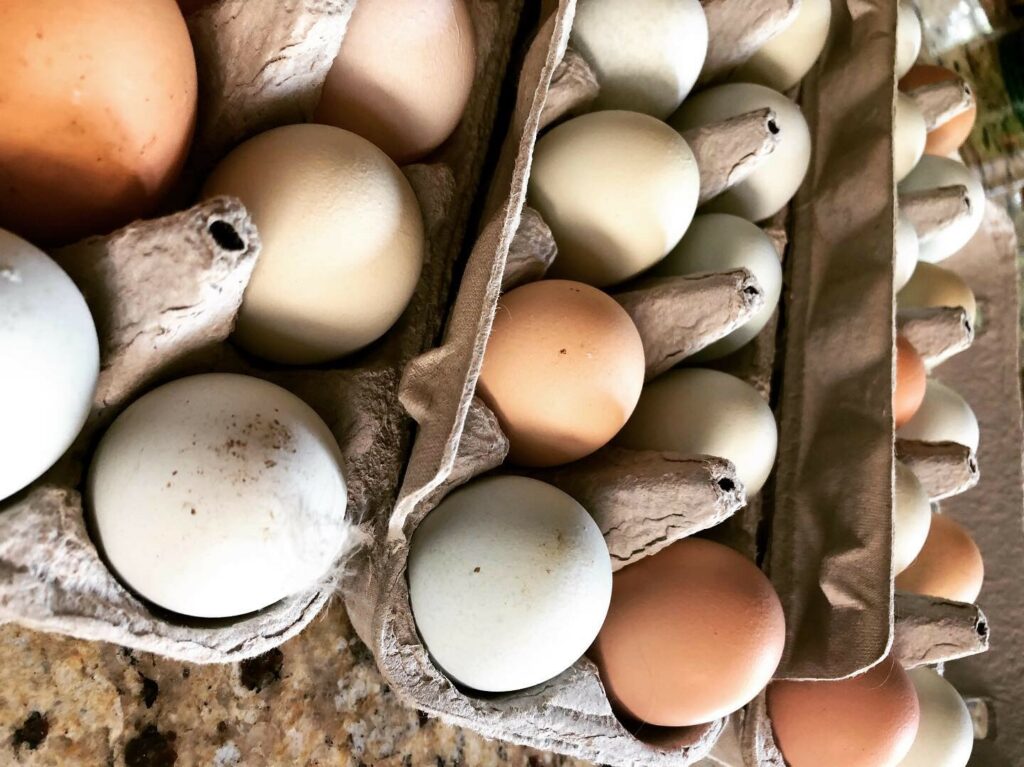

Story of My Trip to the Farm…
If you’ve followed me for a while, you know that I make monthly trips to the farm for my kids’ raw goat’s milk. You can read about why I feed my kids, goat’s milk here. My oldest is almost 5 and I don’t think we’ve ever bought a carton of cow’s milk. That said, he does eat cow dairy. Raw (goat’s) milk is just far superior to any cow milk you can get your hands on. (Why? Read the blog post!)
Our farmer’s name is John and he’s the sweetest farmer we know. We’ve trusted him with our raw milk consumption and some of our egg consumption for over 4 years now. This visit, he shared some interesting facts about eggs.
1. Light causes chickens to lay more eggs but if it’s too hot they’ll stop. During the winter, farmers use artificial light to get more egg production. Maybe less egg consumption during peak summer and winter months is more natural and possibly more ideal.
I’ve since learned that chickens “forced” to lay more eggs are more stressed out and produce fewer eggs over their lifespan. Chickens may need the rest during the winter months and if not, (just like with humans), too much stress will negatively impact their hormones. If we believe that we are more optimal humans with less stress, maybe chickens that aren’t forced to produce eggs will produce higher quality (more nutrient-dense) eggs.
2. Have you noticed in Europe that they do not refrigerate their eggs at the stores? It’s because they don’t wash their eggs and in turn, the eggs have a longer and more stable shelf life. My Americanness used to think Europeans were just so unsanitary. Little did I know…
Eggs have a natural protective coating that allows them to last for over a month without having to be refrigerated. But most of us don’t like to see feathers, mud and poop on our eggs. The trade-off is that our eggs require refrigeration immediately and don’t hold as long because the outer protective coating has been compromised.
3. Salmonella may be most common on the outer shells of the eggs. Make sure you know and trust your farmer as what the chickens eat, will directly impact their poop. Additionally, living conditions will also affect the health of the chicken and the eggs.
I’ll be the first to admit that I used to get grossed out by feathers, dirt and poop on my eggs. Now I know that it’s nature’s way of giving me the freshest, most natural eggs. If you ever pick up farm fresh eggs that have not been washed, rinse them in water before consumption. You may feel the wax-like substance and you’ll know you are eating the most natural nutrient-dense eggs.
This last trip, I was thankful to see a little feather made it home with our eggs. And so while we waited for our boiled eggs, the little feather made for a great nutrient-dense story with the kids.
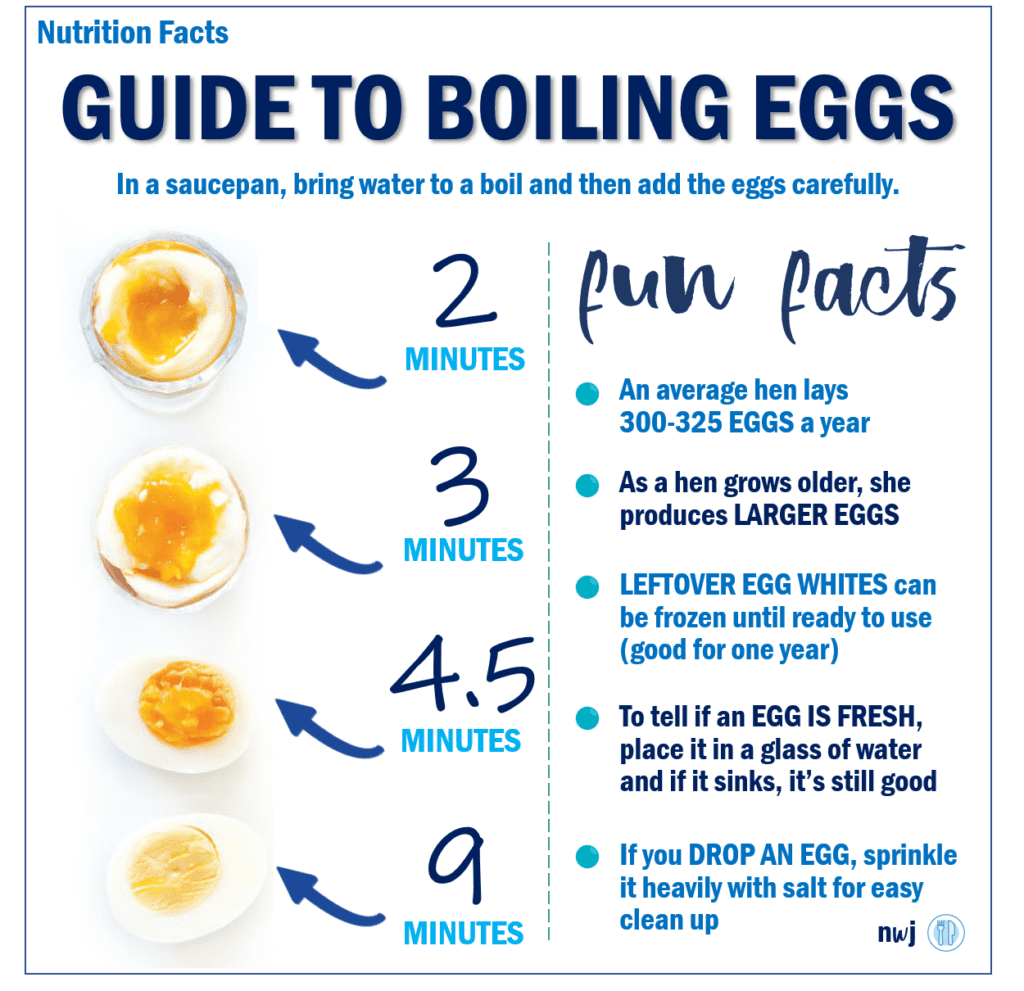

How long do you boil your eggs? I always try to time my boiling and here’s what I’ve found to hold true.
Egg Consumption Limits
Some of you have asked about daily egg consumption ideals. There is none. What I can say is that there is now no recommended upper limit on daily cholesterol intake in the US. So, eat as you please.
While this graphic talks about hard boiling eggs, I want to provide you with some studies on eggs and cooking. Based off my research, if you plan to eat the whole egg, I’d recommend cooking the egg for a short period of time. If you eat only the yolk, I think raw is fine. Here’s some research highlights:
Cooking eggs can make some of eggs nutrients easier to digest. One example is with the protein in eggs. Studies have shown egg proteins become more digestible when heated. This change in digestibility is thought to occur because heat causes structural changes in the egg proteins.
In raw eggs, the large protein compounds are separate from each other. When the proteins are cooked, new bonds are formed that make the proteins easier for digestion. As I’ve previously mentioned, the protein in raw eggs can also interfere with the bioavailability of Biotin. In raw eggs, a protein in egg whites (Avidin) binds to Biotin, making it unavailable for your body to use. When eggs are cooked, the heat causes structural changes to Avidin, making it less effective at binding to Biotin, and allowing Biotin to be more bioavailable.
With all that said, high-heat can damage egg nutrients. One study found that cooking eggs reduced vitamin A content by 17-20%. Another study found that cooking methods, including microwaving, boiling and frying eggs, reduced the number of egg antioxidants by 6–18%.
Overall, shorter cooking times, even at high temperatures, can retain more nutrients. Research has shown that when eggs are baked for 40 minutes, they may lose 60% of their vitamin D, compared to up to 18% when they’re fried or boiled for a shorter period of time.
When eggs are cooked at high temperatures, the cholesterol in them may become oxidized and produce compounds known as Oxysterols. That said, cholesterol that is oxidized in the body is thought to be more harmful than the oxidized cholesterol that you eat.
Duck Eggs
Have you tried duck eggs? Duck eggs have a richer and creamier flavor than traditional chicken eggs.
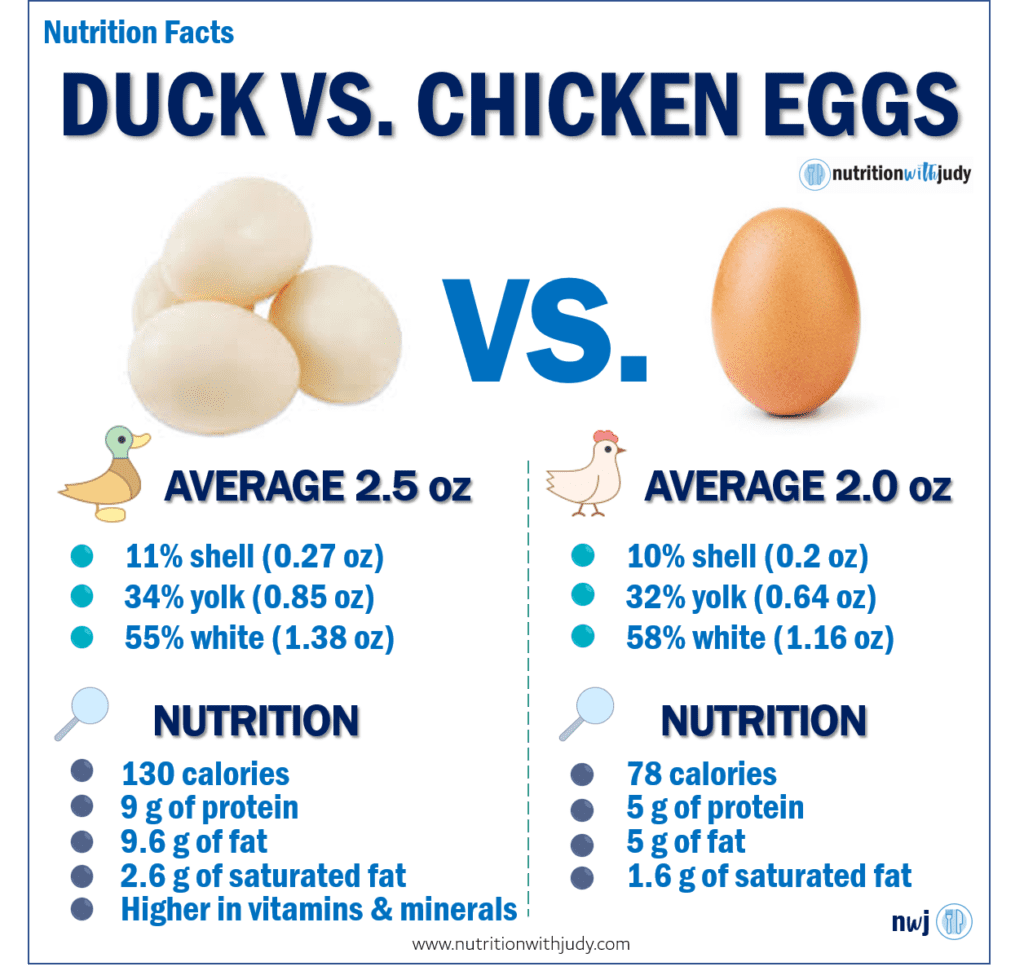

Duck Facts
Here Are Some Facts About Duck Eggs and Why You May Want to Try Them:
1. Duck eggs will typically have more nutrients than chicken eggs.
2. Duck eggs are usually 20-30% larger than a large size chicken egg
3. Duck eggs have more omega-3 fatty acids than chicken eggs
4. Duck eggs have more protein than chicken eggs
5. Duck eggs have more cholesterol than chicken eggs (cholesterol IS NOT bad)
6. Some that have chicken egg allergens are able to consume duck eggs
7. Duck eggs tend to stay fresher longer than chicken eggs because of their thicker shell
8. As with chicken eggs, duck eggs nutrients will vary depending on the animal’s diet.
9. Duck eggs are favored in baking as they have extra egg whites and albumen, making baked foods fluffier (think: egg loaf)
10. Hard boiling duck eggs may make them taste rubbery. Hard boiling duck eggs is not recommended.
11. Duck Eggs are an alkaline-producing food which chicken eggs are more of an acid food.
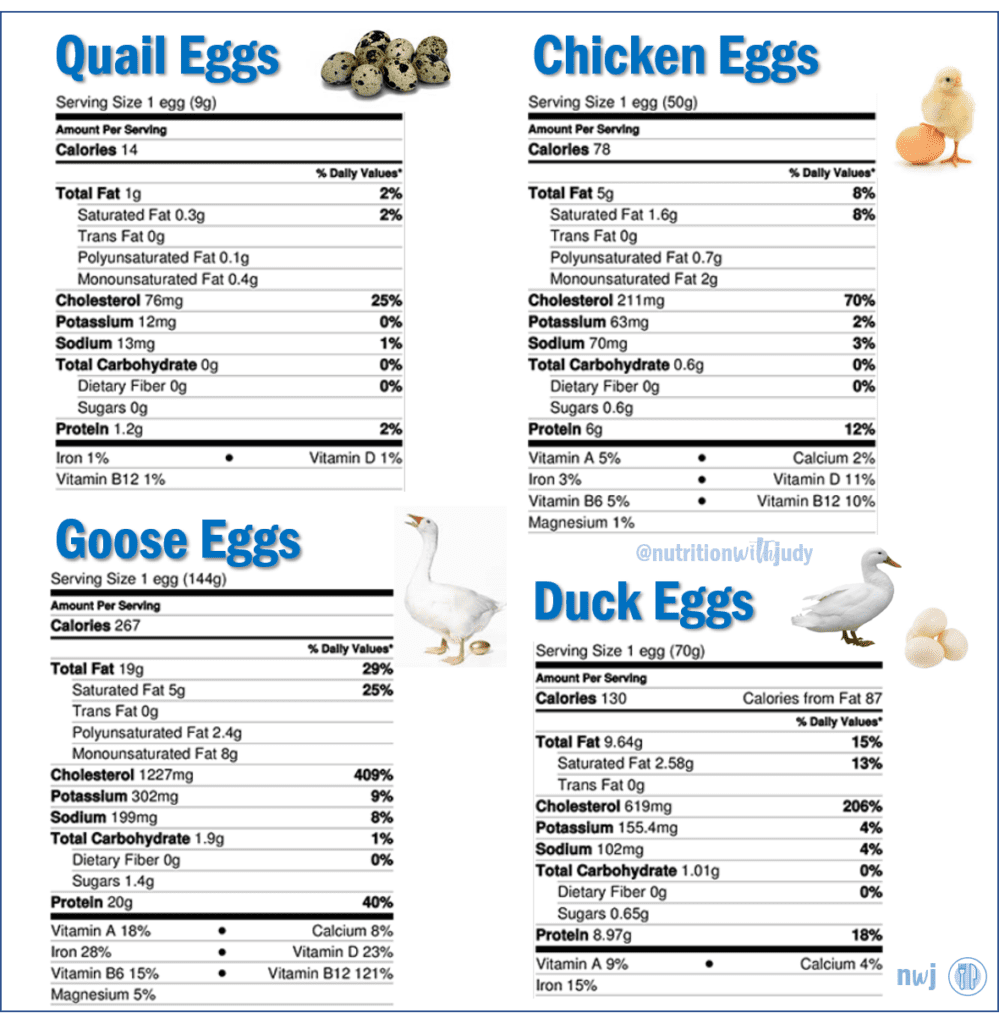

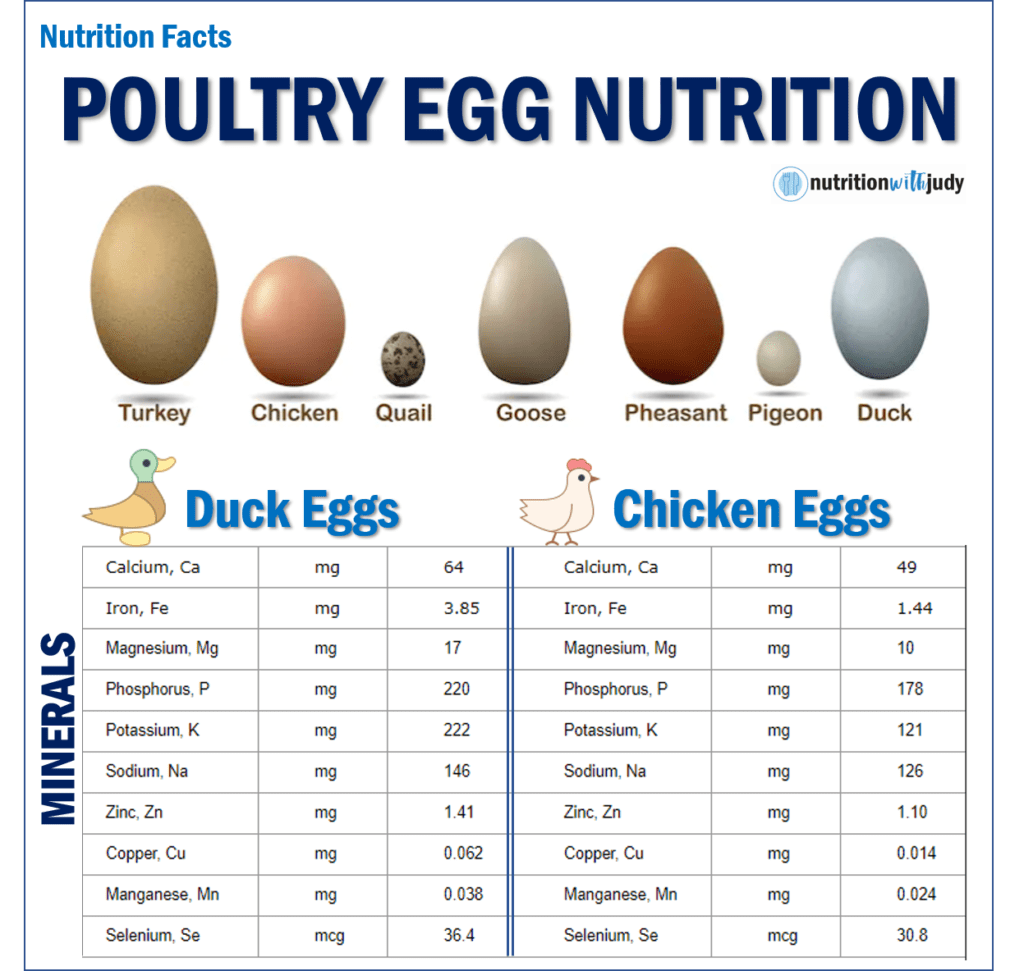

You can purchase duck eggs online and at farmers markets. You can sometimes find them at whole foods-type markets. Otherwise you’ll have to find a local farmer that sells duck eggs.
So why do some that have sensitivities to chicken eggs have no issues with duck eggs? There are studies that show that most allergens to eggs are not IgE anaphylactic (read: EpiPen-needing) allergens but egg sensitivities (read: rash) and gastrointestinal disorders (read: abdominal pain, vomiting, diarrhea).
Both yolk and whites can be allergenic, but the whites are the more common culprit. Although eggs contain over 40 proteins, 5 have been identified as the most common allergens.
Protein content varies among different bird eggs. One of the common allergens albumen makes up 12% of a chicken egg white, but only 2% of a duck egg white.
A study found, it is possible to have a cross-reactive allergic response to different bird eggs, but they also found if you are allergic to one, you may not be allergic to the other.
If you have protein sensitivities to chicken egg whites but not duck, it may be because:
1) ducks having less egg whites,
2) ducks have less of the common protein allergens in chicken eggs and
3) you just may not have the same allergies with different poultry.
The Only Way to Know Is to Try.
On the nutrition-front, duck eggs are higher in omega 3s, vitamin D, vitamin A, folate, B12, and cholesterol—even when comparing gram for gram. In fact, duck eggs have 6 times the Vitamin D, 2 times the Vitamin A, and 2 times the cholesterol than chicken eggs. 100 grams of duck eggs will contain 884 mg of cholesterol, compared to 425 mg in chicken eggs. Duck eggs contain about 75% of the Vitamin E in chicken eggs.
The mineral content of duck eggs and chicken eggs are similar. The duck eggs contain slightly higher amounts of all these minerals.
The vitamin content is also similar, but duck eggs have a higher amount of each vitamin, including thiamin, niacin, riboflavin, pantothenic acid, folate, vitamin B6, vitamin D, vitamin E, vitamin A, vitamin B12 and retinol.
The amino acid content profile is also similar for both eggs, with ducks containing more amounts of each amino acid. The amino acids included are alanine, arginine, aspartic acid, cysteine, glycine, histidine, isoleucine, leucine, lysine, methionine, phenylalanine, proline, serine, threonine, tryptophan, tyrosine and valine.
Low Carb Egg Recipes
In celebration of Egg day and a very detailed post about the Incredible Edible Egg, here are some low carb egg recipes.
Eggs are really so versatile that you can make just about anything with them. They are in many savory dishes, as well as many sweet dishes. They can be a snack, an appetizer or even part of the main dish– the egg really is limitless.
Here are some of my favorite egg recipes. Most of them are low carb and they are a perfect on-the-go breakfast food, snack or lunch option.
I’d recommend using organic pasture raised eggs and grass-fed butter as they are more nutrient-dense than conventional eggs. They have found to be higher in vitamin A, vitamin E, and omega-3s. They also do not receive any hormones, vaccines or antibiotics. If you have allergies to dairy, you can opt for grass-fed ghee as it removes all lactose from the butter. That all said, my personal belief is that any egg is better than no eggs.
Alright, let’s get our chef hats on and do some cooking!
Recipe 1: Scrambled Eggs
We all love scrambled eggs. It’s so easy to make and I thought mine was special because I would add a little bit of milk or heavy whipping cream. Then, many years ago, my husband put me to shame by showing me the perfect egg scramble recipe by Gordon Ramsey. You can watch Gordon Ramsey create the perfect scramble here.
Ingredients:
6 eggs
25 g of butter, cold and cubed
1 tablespoon of crème fraiche
To Garnish (optional):
Fresh ground pepper
Chopped chives
Salt to taste
Directions:
1. Break eggs into a pan and add the cubed butter.
2. Stir over medium heat until the eggs start to cook. Remove from heat continue stirring eggs for about 20 seconds.
3. Return to heat, continue to stir eggs until they start to clump, remove from heat and add the creme fraiche. Return to heat stirring in crème fraiche.
4. Remove from heat when eggs are clumpy but soft.
5. Season with salt, freshly ground black pepper and garnish with a sprinkling of chopped chives.


Recipe 2: Faux Starbucks Egg Bites
If you’ve had the sous vides egg bites from Starbucks, you know they are pretty good. But you also know that they cost a pretty penny. Here’s a DIY version that won’t break the bank and also gives you the freedom to use higher quality ingredients.
Ingredients:
5 eggs
½ cup of shredded gruyere or swiss cheese
¼ cup full fat cottage cheese (or cream cheese or non-dairy cream cheese)
2-4 thick slices of cooked bacon
¼ TSP kosher salt
Black pepper to taste
Cooking oil (lard, ghee, tallow, coconut oil or avocado oil work best)
Directions:
Recipe makes 6 egg bites
1. Make sure to cook the slices of bacon before making the egg bites.
2. Pre-heat oven to 300 degrees F and place a baking dish that is filled with 1 inch of water on the bottom rack. This will create a humid environment and help the eggs cook evenly.
3. Add the eggs, cheese, cottage cheese, salt, and pepper to a blender and blend on high for 20 seconds until light and frothy.
4. Spray a muffin tray with the cooking oil.
5. Fill the muffin tray almost all the way to the top with the egg mixture.
6. Divide the chopped bacon equally.
7. Bake in the oven for 30 minutes, or until the center of the egg bites are just set.
8. Remove from oven and let cool for 5 minutes
9. Store the egg bites in the fridge for 3 days or freeze for 2-3 months.
10. Reheat in the microwave or warm oven.


Recipe 3: Bacon Deviled Eggs
Who doesn’t like bacon and deviled eggs? This recipe calls for both with an added bonus of cheddar cheese.
Ingredients:
6 hard boiled eggs
5 slices cooked bacon, crumbled
¼ cup of sour cream
½ cup shredded (sharp) cheddar cheese
1 TSP Dijon mustard (yellow mustard works too)
1 TSP fresh dill weed or chives (optional)
¼ TSP Himalayan pink salt (Sea salt, Celtic salt, etc.)
¼ TSP pepper
Directions:
1. Cook hard-boiled eggs to desired consistency (see graphic above).
2. Slice hard-boiled eggs in half.
3. Place yolks in a mixing bowl and set aside whites.
4. Add the yolks with the sour cream, mustard, dill/chives, salt, and pepper to the bowl. Mix well to combine.
5. Stir in shredded cheddar and crumbled bacon.
6. Spoon the filling into each of the egg whites.
7. Sprinkle with additional dill, chives, or bacon crumbles.


Recipe 4: Egg Loaf
This recipe is one of my favorite ZERO CARB egg “bread” recipes. If you do want to add some flour, I have some notes on adding coconut flour to the recipe.
Ingredients:
8 oz of cream cheese (room temperature, softened)
4 oz of butter (room temperature, softened)
8 eggs
Sweetener to taste (if desired)
Optional Carbs:
4 TBSP of coconut flour
1 TBSP of baking powder
Pumpkin Spice Version Add-On:
8 TBSP of pumpkin puree
2-4 TSP of pumpkin pie spice
Directions:
1. Preheat oven to 350 F and butter a loaf pan.
2. Use an immersion blender or food processor to combine cream cheese, butter, and eggs.
3. Pour into greased loaf pan.
4. Bake for 45 minutes – 1 hour, until the center looks lightly browned.
5. It will deflate when cooled.
6. Once cooked, you can chop it into pieces and fry them with butter for an extra crisp. Otherwise, you can eat it once the egg loaf cools from the oven.
These are perfect for packed lunches!
Coconut Flour Add-On:
1. If you want it to be more like bread, add 4 TBSP of coconut flour and 1 TBSP of baking powder
*Note: You can use almond flour but almond flour is higher in anti-nutrients. As you can’t soak or sprout almond flour, I’d opt for coconut flour.


My Favorite Eggs
I personally keep it simple and eat my eggs scrambled, sunny side up or hard boiled. Whichever way you like to have your eggs, remember you are doing your body good by eating them. Try to eat eggs daily and don’t fear the misinformation of eggs raising your serum cholesterol. While I can’t get into that here, you can do some light reading here and some more evidence-based reading here.
Let me know if you try duck eggs and/or any of the recipes!
Until next time, I hope that you try to incorporate more nutrient-dense eggs in your meals and on-the-go snacks. Don’t fear eggs. You can have them daily and with their nutrient density, why wouldn’t you?




Joelle
June 27, 2019 at 8:32 pmThank you!!
Mick Moriarty
February 2, 2020 at 7:58 pmBloody delicious as Gordon would say!
DAVID RICKETTS
April 19, 2020 at 3:12 pmSee Duck Fact #2…This is way wrong! Duck eggs are NOT 3 times the size of chicken eggs.
admin
April 20, 2020 at 1:23 amYou’re right. They’re maybe 20-30% larger. Not sure why I wrote that then. Oversight. I’ll make the update!
Brandie Coad
May 1, 2020 at 12:43 pmWhat a great article!
Bionaze
August 6, 2020 at 6:56 amWow, I never would have thought that I still have so much more to learn from this blog about our daily consumption of eggs! Thank you for being thoughtful about sharing this very informative and very helpful pieces of information!
Nutrition with Judy
September 4, 2020 at 1:19 amThank you. YES! Eggs are fascinating!
troubles1956@gmail.com
July 23, 2022 at 8:00 amI love eggs and I mostly eat the french omelet like Julia Child made them. C’est délicieux!
Rick
August 8, 2023 at 8:53 amFor the Egg Loaf, can you use Grass Fed Organic Heavy Cream instead of the cream cheese? Cream cheese usually has other ingredients like gum, etc whereas heavy cream is just one ingredient. Thoughts?
Nutrition with Judy
August 10, 2023 at 10:33 amYes, you could but it may not be as thick. You can try Mascarpone, Cottage Cheese, Sour Cream, or Greek Yogurt.
Mascarpone may be the cleanest!
Donna Cieslak
October 13, 2023 at 2:46 pmDo I have to use all those eggs May I use half whole eggs and the rest egg whites